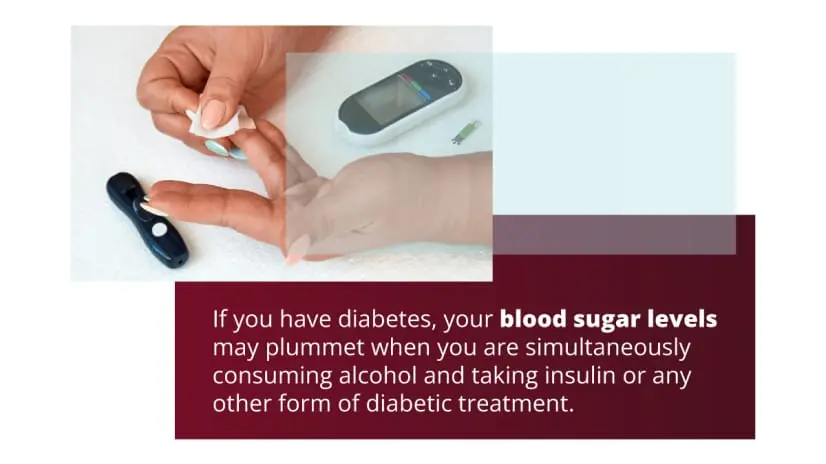
Binge Drinking Dangers: The Harm of a Night Out
Discover the dangers of binge drinking and tips to curb excessive drinking at Indiana Center for Recovery.

Those who have diabetes should be cautious when drinking alcohol as there could be repercussions to their health if they begin to drink heavily. Individuals who are diabetic may experience high blood pressure, nerve damage, and vision problems. If diabetes is not being properly managed, the condition can progress. Drinking when diabetic can be even more difficult to manage.

Here is everything you need to know about diabetes and alcohol:
Tell your doctor if you are drinking and have diabetes to avoid health complications.
If you have diabetes, your blood sugar levels may plummet when you are simultaneously consuming alcohol and taking insulin or any other form of diabetic treatment. Drinking alcohol can destroy your nutrition, resulting in drastic low blood sugar levels, and can potentially cause death.
Additionally, alcohol consumption may also affect your ability to detect and treat hypoglycemia. When diabetic individuals consume alcohol, it can cause low blood sugar symptoms that often include weariness or dizziness. According to the Centers for Disease Control and Prevention (CDC), about 38.4 million Americans have diabetes. When diabetes is not treated, long-term issues arise that can cause severe health ramifications.
Studies show a direct correlation between alcohol consumption and decreased sugar levels among individuals who have diabetes. When the brain does not receive sufficient glucose, it causes physical and mental health damage and memory issues.
Several medications are not compatible with alcohol. If you are diabetic and drinking alcohol, it is important to tell your doctor about proper medication and guidelines. According to the University of California San Francisco (UCSF), diabetic women should limit their alcoholic drinks to one per day and diabetic men to two per day. However, the topic remains controversial as moderate amounts of alcohol are not proven to be less harmful. Diabetics who quit alcohol often experience a stabilization in blood sugar levels as well as decreased chances of becoming obese.
The liver’s primary function is to store hepatic glycogen, a type of glucose that is accessible when you have eaten. Its role is to detoxify the body, and it can only perform one task at a time. When drinking alcohol, the liver can either balance blood sugar levels or detoxify. The liver works harder when eliminating ethanol, a component in alcoholic beverages, from the bloodstream versus managing blood glucose levels. When blood glucose levels are low, it is best to avoid alcohol.
Heavy alcohol consumption may cause pancreas inflammation, which in turn may make it impossible for insulin to be naturally produced by the body. When this occurs, individuals are susceptible to developing diabetes. High blood pressure and heart attacks can occur in those who have heavy drinking habits.
Alcohol consumption is harmful and can cause complications of diabetes to worsen. Even if moderating alcohol consumption, it still has the potential to affect the body’s sensitivity towards insulin. According to the American Diabetes Association (ADA), it is extremely dangerous for people with diabetes to drink on an empty stomach or with low blood sugar. Diabetics should avoid heavy craft beers as they automatically alter sugar levels and cause imbalance.
When people who have diabetes overindulge in alcohol, their health and lives are jeopardized. If you are someone with diabetes and drink heavily, you are at risk of hypoglycemia, a rapid drop in blood sugar. When sugar levels drop too low, you may feel dizzy, confused, lethargic, or drowsy, and if left untreated, you are at risk of coma or other health complications.
When individuals abuse alcohol, it can lead to chronic inflammation of the pancreas, resulting in pancreatitis, where the pancreas becomes entangled or enlarged and can result with chronic diabetes. The ability to produce insulin becomes disabled, worsening the condition.
Consuming alcohol in excess can lead to reduced body sensitivity towards insulin and may cause diabetes. Heavy drinking habits have the potential to develop type 2 diabetes if obesity occurs due to alcohol.
Yes, as drinking with diabetes has serious repercussions and can worsen the condition, causing more complications in your health. Alcohol consumption can cause your liver to malfunction and would be unable to regulate blood sugar levels. Alcohol consumption should be avoided if you have diabetes. If you do drink, it is best to limit and control the amount you take as long as your blood sugar levels are balanced and well-maintained.
If you or a loved one has diabetes and is struggling with alcohol abuse, Indiana Center for Recovery can help. We can provide treatment best suited to your condition to meet all your health and safety needs. To find out about our services and how we can help, please call us at (844)-650-0064.